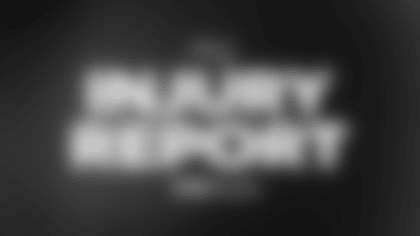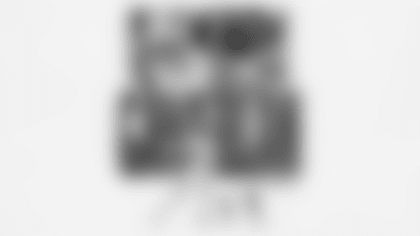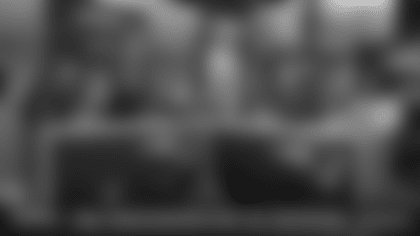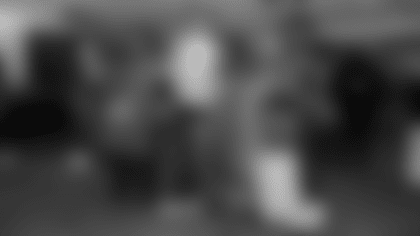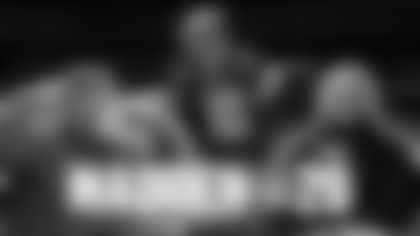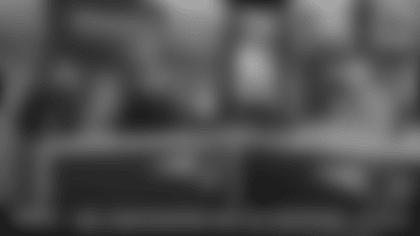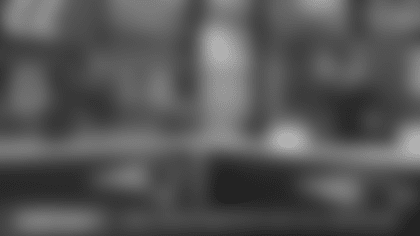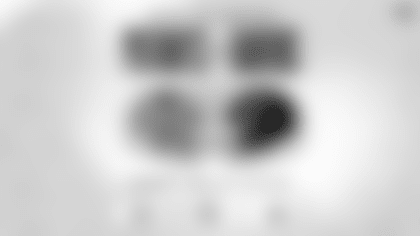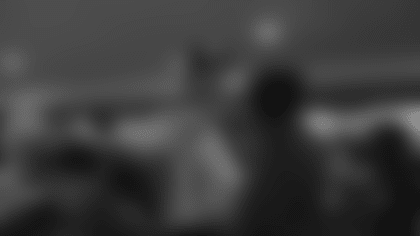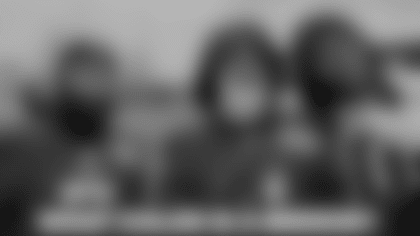A group of NFL officials was at Gillette Stadium Thursday morning to help players, coaches and fans understand some of the new rules for the 2006 season. After convening in Dallas earlier this summer, the officials have been sent to training camps around the country to hone their skills and keep coaches and players aware of what will be called this fall.
After the day's morning practice, 12-year NFL umpire Jeff Rice spoke to the press. Rice, who has officiated three Super Bowls (including the Patriots first two championships), was accompanied by head linesman Ron Phares and field judge Buddy Horton. The group was on hand to explain rule changes and to answer questions – an opportunity not frequently afforded to the press by the NFL. The changes were recommended by the NFL Competition Committee, and have been installed by the league for the upcoming season.
Rice showed a 12-minute film compiled by the league to help clarify the rule changes.
A few rules involving instant replay have been modified for the 2006 season. One big change that's raising eyebrows and causing concern is that instant replay can now be used to review 'down by contact' calls.
A challenge can now take place when a runner is ruled 'down by contact,' but he actually fumbled the ball, and the recovery takes place during the continuing action of the play. If the ruling is changed after the review, the recovering team gets the ball at the spot where it was recovered, with any additional progress nullified. If the referee doesn't have indisputable visible evidence of who recovered the ball, the initial ruling will stand.
Patriots Head Coach Bill Belichick expressed some concern about how this new rule will play out in games, although in the end he deferred to the "experts."
"I think in this particular rule, we're kind of going into an area that we haven't gone into," said Belichick. "The old adage of 'play to the whistle' might not be good enough any more. I think that leads into some other questions, particularly with player safety, or some guys are playing beyond the whistle and other guys may not be. Some guys may see the ball if it's loose, other guys may hear the whistle and not see the ball. I'm not sure that everybody is reacting to the same thing. Again, this isn't a rule we made. But we have to try to understand it and play it as it is going to be interpreted and officiated.
"I didn't do all the research on the rules so I'm not an expert on it, but there are a lot of concerns that were brought up on the rule that is proposed and I think there are a lot of issues that need to be resolved."
Based on his reaction to questions about the new rule, Belichick still hasn't really received all the answers he's looking for.
"You let them answer the questions," Belichick said, referencing the officials. "I don't have all the answers. Other people do, so they should probably give them to you."
Hopefully, this new rule will do what it's designed to -- protect players rather than endanger them.
Since 1999, the referee has been allowed 90-seconds to review the play. This season, each review will be a maximum of 60-seconds. Rice also explained that the reviewed call can and will now be announced as soon as it's been made, rather than waiting for commercial breaks to end as in previous years. Such modifications to the process are in the interest of keeping the game moving.
The film also designated some changes as specifically in effect to help keep players safe.
Some of the safety-minded rules reiterate previous rules. For example the horse-collar tackle, which involves grabbing the inside collar of a runners shoulder pads, was banned before the start of the 2005 season. But this season, the definition of this illegal tackle has been broadened so that players can also no longer grab the back or side of the runner's jersey collar. This foul carries a 15-yard penalty for unnecessary roughness, and is not applicable to a runner in the tackle box or a quarterback in the pocket.
It was also specifically expressed that players on the kicking team may not block members of the return team in the back. This is often seen as a way of taking a blocker out of the play, but as with other forms of clipping, it will not be tolerated by NFL officials.
Another rule has been put in place to keep long snappers safe, and it dictates that a defensive player who is within one yard of the line of scrimmage at the snap must have his helmet outside the snappers shoulder pads. This rule is designed to prevent defenders from attacking snappers who are vulnerable while long snapping to punters and holders. It will carry a five-yard penalty for illegal formation on the defense.
Continuing with rule changes that apply to special teams, onside kicks may have a significantly different look this season, as "stacking one side" will no longer be allowed. Beginning this season, at least four kicking team players must be on each side of the kicker when the ball is kicked. If that's not the case, the call will be illegal formation on the kicking team. Again, the rule exists to protect members of the receiving team.
Coach Belichick explained that the rule will keep things spread out on kicks, adding that "On the return side of it, if they can only put six guys over there, then you're you going to have to keep some people to match whoever they keep on the backside. So it's going to be a little bit more of a balanced onside kick type of formation. If you want to just line up and kick it over here and show it, you're just working with fewer guys. That's all. It's the same principle, but you just have six guys instead of nine or 10."
Added to the long list of fouls designed to protect the quarterback, a rushing defender is now prohibited from forcibly hitting a passer who has one or both feet on the ground, in the knee or below, even if the initial contact is above the knee. The violation carries a 15-yard penalty for roughing the passer and does not apply if a defender has no opportunity to avoid the quarterback. Also, if the passer is scrambling and does not re-establish himself as a passer, it is not a foul. This rule comes, at least in part, in response to the high number of knee injuries suffered by quarterbacks such as Carson Palmer and Daunte Culpepper last season.
Rice also explained a couple changes to the way specific rules will be enforced.
Any foul by the kicking team before the receiving team has possession of the ball, the offended team can either take the penalty at the previous spot and replay the down, or add the penalty yardage onto the end of the play. This applies to both free kicks and scrimmage kicks. If the foul occurs at the end of a period, the period may be extended by an un-timed down if the receiving team accepts the foul.
Another rule that may cause uproar among players and fans involving celebrations has been added. As before, it is illegal for two or more players to engage in prolonged, excessive, or premeditated celebrations or demonstrations.
Beginning this season, it will also be illegal for individual players to engage in similarly long, prolonged or excessive type celebrations. Players may not use any props in celebration, including the football itself. Spiking will still be allowed (so long as it isn't aimed at anyone). Also, players can still dunk the ball over the uprights, jump into the crowd, kneel for a prayer, etc. Respectful, legal celebrations may not be prolonged after a warning, or they will be considered a delay of game.
In-your-face taunting will be treated with seriousness this season by officials, due to a rise in this type of behavior last season.
The Competition Committee has also categorized types of offensive holding, so as to make the calls more clear. As before, offensive blockers may not grab, jerk, tackle or drag an opponent to the ground.
Officials will also be on the lookout for motions by offensive lineman designed to draw defensive lineman into encroaching. Unsportsmanlike treatment of quarterbacks will also be treated with utmost seriousness this season.
Looking back on the great game of football, it is easy to see that it has evolved. Whether it be allowing the forward-pass, moving the goalposts from the front of the end zone, installing instant replay, or protecting the legs of valuable quarterbacks; fans and players alike will have to continue to adapt as the game does. It looks like the 2006 season will once again be part of that.


